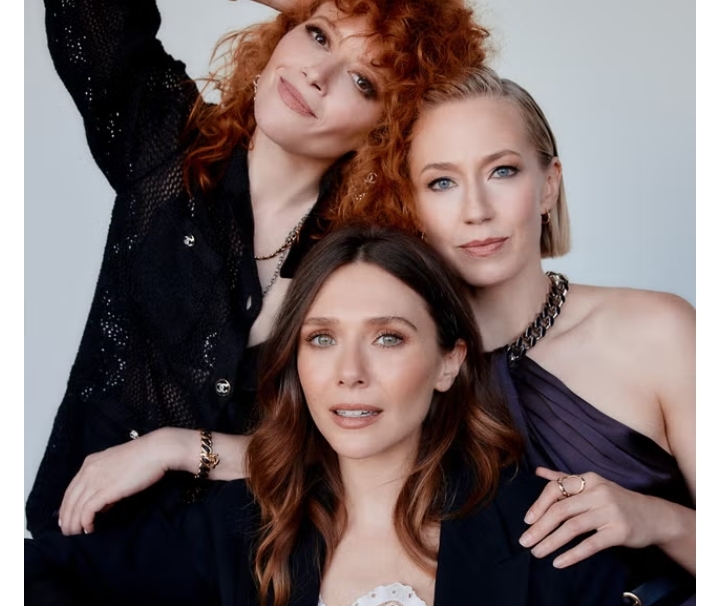CELEBRITY
Natasha Lyonne, Elizabeth Olsen and Carrie Coon: ‘Our screaming match? We were ready to…see more

Natasha Lyonne, Elizabeth Olsen and Carrie Coon: ‘Our screaming match? We were ready to rumble’
The three actors play sisters in Azazel Jacobs’ bracing, bruising drama ‘His Three Daughters’. They speak to Annabel Nugent about bonding over word games, playing against type, and the untidy nature of grief
What does it take for Natasha Lyonne to quit smoking? Like Marlene Dietrich and James Dean before her, Lyonne is an actor who, for as long as anyone can remember, has had a Marlboro Light permanently affixed to her hand. Russian Doll? Pack of cigs. Poker Face? Pack of cigs. Orange Is the New Black? Probably smuggling a pack of cigs into jail.
Getting Lyonne to snuff out the habit, then, was no easy feat. That is, unless you’re Gone Girl’s Carrie Coon and Marvel star Elizabeth Olsen, whose words of sisterly concern did overnight what dozens of medical professionals over the years had failed to do. “They’re why I quit,” Lyonne tells me in the large event room of a Soho hotel.
The three actors had traded verbal blows, and Lyonne lost her voice the next day as a result of all the yelling. “Carrie and Lizzie were like, ‘Gosh, that shouldn’t happen… you know, maybe you should quit smoking?’ and I was like, ‘Yeah! Maybe I should!’” she recalls. “Now granted, doctors and strangers had been telling me this for decades, but that was the turning point – and I’ve been vaping 9,000 vapes a day ever since, so it’s been incredible.” On cue, she takes a puff of her big pink vape and smiles.
Tabloids will despair to learn that the trio’s screaming match wasn’t for real, but part of His Three Daughters, a bruising chamber drama that is now on Netflix. Lyonne, 45, Coon, 43, and Olsen, 35, play semi-estranged sisters who convene to care for their sick father. Like many sibling dramas, this one involves guilt, misunderstanding, recrimination, resentment, and love.
Shot over 21 days in a modest Brooklyn apartment, it’s an insular watch with a tamped-down melancholia. That’s something of a trademark for director Azazel Jacobs, whose last film was an off-kilter adaptation of Patrick deWitt’s French Exit that starred Michelle Pfeiffer. Here, he offers a clear-eyed meditation on grief – if only to say it is anything but.
As often happens when actors portray intimacy, the feelings on screen have bled into real life – the positive ones, at least. Coon and Olsen are ecstatic to see one another tonight, catching up like old classmates at a school reunion. Lyonne, I speak with separately; she’s running late from the set of Marvel’s The Fantastic Four. “You won’t use anything we’ve said, because Natasha will be so interesting,” jokes Coon. “She’ll arrive looking amazing, probably in something black, leather and Chanel.”
None of the three actors had worked with each other before. They are, though, big fans of one another’s work, which might sound like lip service if there wasn’t so much to admire in each of their careers. Coon, for one, is perhaps best known for HBO heavy hitters like The Leftovers and The Gilded Age; Olsen for Marvel’s WandaVision and Taylor Sheridan’s Wind River; and Lyonne for the seminal lesbian romcom But I’m a Cheerleader.
“We’re all women – ‘women in film’ or whatever – and it was an exciting opportunity for me to work with these women who I felt I wanted to become closer with,” Olsen says. It’s rare, too, that you get to share the screen with not one but two women, adds Coon. “Usually films will say, we just need one, thanks. Or one old and one young.” Olsen rolls her eyes in agreement: “Or they want one lead and one supporting!” Coon nods; the point is that “actresses never get to work together, so this was very satisfying”.











